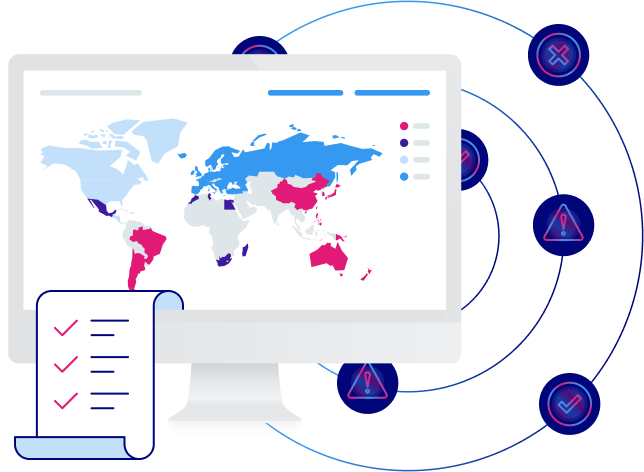-
Solutions
- AI Governance
- AI Risk
- Geo-Specific Cookie Banner
- Consumer Preference Management
- Data Subject Request Automation
- Data Mapping and Vendor Risk Management
- Migrate
- Privacy, Vendor, and Risk Assessments
- Privacy Program Management
- Regulatory Guidance
- Privacy Program Consulting
- Certifications and Verifications
- International Data Transfers
Forrester TEI ROI of Privacy ReportTrustArc commissioned a Forrester study to analyze the potential benefits of using our platform and the Forrester team found ROI linked to efficiency, compliance, and decreased cost in data breaches.
Read the report -
Products Products Privacy Studio Overview
Automate consent and data subject rights compliance. Design seamless privacy experiences to enhance customer trust across your digital landscape.
- Cookie Consent Manager Effortlessly manage cookie consent for global compliance, ensuring a secure, personalized browsing experience.
- Consent & Preference Manager Easily manage and orchestrate customer consent and preferences across brands and channels.
- Individual Rights Manager Automate and streamline DSR workflows to ensure compliance and show your commitment to customer rights.
- Trust Center Centralize policies, disclosures, and trust-building information in a customizable no-code hub that speeds up deals.
Products Governance Suite OverviewStay ahead of privacy and compliance regulations. Simplify data privacy management and ensure data governance with cutting-edge apps.
- PrivacyCentral Centralize privacy tasks, automate your program, and seamlessly align with laws and regulations.
- Data Mapping & Risk Manager Gain full visibility and control of your data and accurately identify and mitigate risks.
- Assessment Manager Automate and score privacy assessments like PIAs and AI Risk, streamlining your compliance workflow.
- Nymity Research Get instant access to the latest in privacy regulations, legal summaries, and operational templates.
Products Assurance Services OverviewGain trust and credibility with leading privacy certifications from unbiased experts, backed by technology for unmatched privacy compliance assurance.
- Dispute Resolution
- TRUSTe Global CBPR and PRP Certification
- Data Privacy Framework Verification
- TRUSTe APEC CBPR and PRP Certification
- TRUSTe Responsible AI Certification
- TRUSTe Enterprise Privacy Certification
- CCPA/CPRA Validation
- GDPR Validation
- TRUSTe Data Collection Certification
- TRUSTe EDAA Privacy Certification
- Digital Advertising Alliance Validation
-
Regulations
- EU General Data Protection Regulation (GDPR)
- California Consumer Privacy Act (CCPA)
- Virginia Consumer Data Protection Act (CDPA)
- NIST AI Framework
- ISO/IEC 27001
EU Artificial Intelligence Act (EU AI Act)EU's regulation on the use of AI and the world's first comprehensive AI law.
Learn moreData Privacy Framework (DPF)Transatlantic data transfer mechanism for EU-U.S., UK, and Swiss-U.S. commerce.
Learn more - Resources
- Contact us
Gramm-Leach-Bliley Act (GLBA)
GLBA requires financial institutions – companies that offer consumers financial products or services like loans, financial or investment advice, or insurance – to explain their information-sharing practices to their customers and to safeguard sensitive data.
Are you subject to the GLBA?
The GLBA covers various financial institutions and entities that either operate in the U.S. or have customers in the U.S. It encompasses a range of financial institutions, like:
- Banks and credit unions
- Mortgage brokers
- Insurance companies
- Securities firms
- Investment advisors
- Mortgage lenders and brokers
- Tax preparers
- Consumer reporting agencies
Obligations under GLBA
Privacy policy
Financial institutions are required to provide customers with clear and conspicuous notice of their privacy policies.
Opt-out provision
Customers must be given the opportunity to opt out of the sharing of their nonpublic personal information with non-affiliated third parties.
Safeguarding personal information
Financial institutions must establish safeguards to protect the security and confidentiality of customer information.
Pretexting prohibition
Prohibits the practice of pretexting, which involves obtaining personal information through false pretenses.
Compliance requirements
Financial institutions are required to develop and implement a comprehensive information security program.

State of Privacy Management in Financial Services
To compete in today’s world, financial services companies need to embrace privacy to create more personalized experiences for consumers.
Achieve compliance
-
Privacy program development and compliance management Identify gaps and track compliance with PrivacyCentral – assess GLBA regulation specifics and automatically get insights and reporting for a sustainable privacy program.
-
Regulatory guidance and operational templates Stay ahead of regulatory changes with expert guidance, ensuring your security and privacy practices remain compliant and up to date. Utilize expert written operational templates for sample policies, checklists, and more.

FAQs
The information provided does not, and is not intended to, constitute legal advice. Instead, all information, content, and materials presented are for general informational purposes only.



